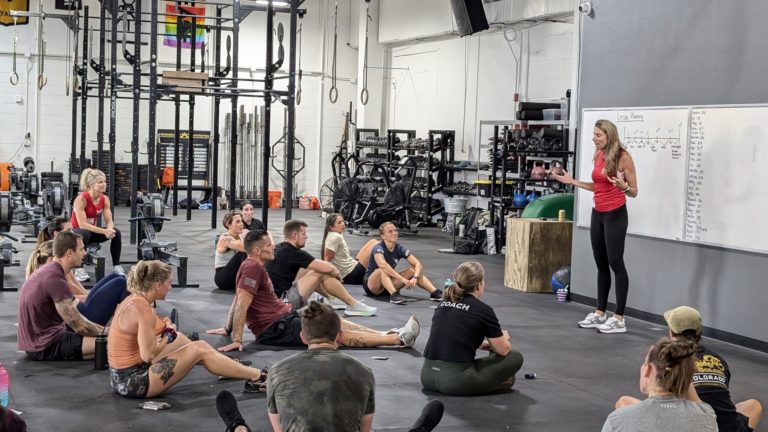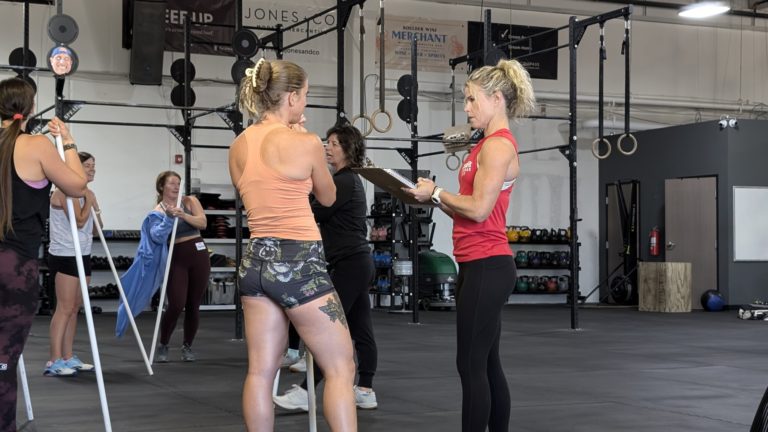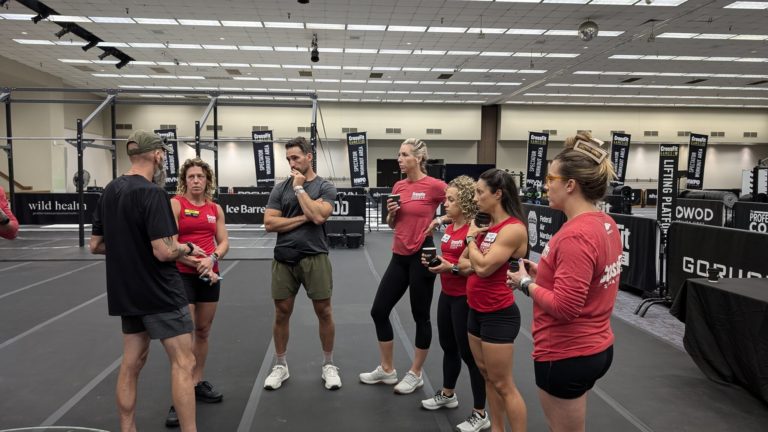Coaching in CrossFit requires constant growth and adaptation. Whether managing a seasoned team of trainers or just starting as a gym owner, the key to long-term success lies in continually nurturing and developing your coaching staff. This development is not just about technical skills; it’s about cultivating critical thinking, encouraging lifelong learning, and providing feedback that fosters improvement.
Lifelong Learning: The Foundation of Great Coaching
One of the most striking principles in coaching is the understanding that learning never stops. Nicole Christensen, Certified CrossFit Level 4 Coach and owner of CrossFit Roots, who has been teaching on the gym floor for over 15 years, exemplifies this. Christensen still feels the need to expand her knowledge. “There’s not a day when I come off a class and don’t think through all the ways I could have made it better. What’s more, I’ve come to appreciate how my understanding of a movement now, compared to 15 years ago, is so much deeper and well-versed,” she says. “I think you can only get to the realization that there are still breakthrough moments ahead through years of coaching movements, hearing different perspectives, and messing it up, even in years 15, 20, and beyond.” This sentiment underscores the fundamental idea that even elite coaches must continue to evolve in their craft.
The pursuit of knowledge is a defining trait of CrossFit coaches and athletes. The CrossFit community’s unwavering commitment to a comprehensive and constantly evolving approach to fitness, coupled with the value placed on pushing boundaries when new data and observations emerge, is a testament to this. Nicole Carroll, Chief Brand Officer for CrossFit and former Director of Training, underscores the significance of continuing education. “The goal of continuing education is to remain at the forefront of your field and to continually improve,” she says. CrossFit’s certification programs, including the Certified CrossFit Trainer (CF-L3) and Certified CrossFit Coach (CF-L4), are designed to promote ongoing education and practical experience through extensive coaching hours.
The Role of Continuing Education in Coaching Excellence
 In CrossFit, certificate courses like the Level 1 and Level 2 provide a solid foundation but are only the beginning. Carroll emphasizes that upon completing a Level 1 Course, many coaches realize how much they don’t know. This understanding propels them to seek further credentials and practical coaching experience. Continuing education, like the kind we offer through our online course platform, fosters technical mastery, but more importantly, it drives coaches to stay curious and critically engaged with their work. This is essential in a field where misinformation is rampant. As you have undoubtedly experienced, social media is not a good filter for excellence and often rewards good marketing more than good coaching, which can mislead inexperienced trainers.
In CrossFit, certificate courses like the Level 1 and Level 2 provide a solid foundation but are only the beginning. Carroll emphasizes that upon completing a Level 1 Course, many coaches realize how much they don’t know. This understanding propels them to seek further credentials and practical coaching experience. Continuing education, like the kind we offer through our online course platform, fosters technical mastery, but more importantly, it drives coaches to stay curious and critically engaged with their work. This is essential in a field where misinformation is rampant. As you have undoubtedly experienced, social media is not a good filter for excellence and often rewards good marketing more than good coaching, which can mislead inexperienced trainers.
Christensen underscores the importance of coach development for every coach she employs, mentors, and trains. “The minute you think you know all there is to know, you’ve failed,” she says. Her approach is centered on the idea that coaches should always add depth to their knowledgebase as there is always a course, observation, shadowing opportunity, or mentor that can propel even a veteran coach to the next level.
Implementing Coach Reviews: A Practical Approach to Improvement
 While continuing education ensures coaches are growing their knowledge base, performance reviews provide a structured way to assess and improve the quality of their coaching. Many CrossFit gym owners struggle with the idea of formal evaluations, feeling it resembles the corporate world many have tried to escape. However, neglecting regular feedback can stunt a coach’s growth and prevent gyms from offering the best experience to their members.
While continuing education ensures coaches are growing their knowledge base, performance reviews provide a structured way to assess and improve the quality of their coaching. Many CrossFit gym owners struggle with the idea of formal evaluations, feeling it resembles the corporate world many have tried to escape. However, neglecting regular feedback can stunt a coach’s growth and prevent gyms from offering the best experience to their members.
Another strategy Christensen employs is radical candor — the idea that feedback can and should be kind, clear, specific, and sincere — yet completely truthful and honest. After discussing this concept with longtime Seminar Staff Flowmaster Adrian Bozman, she began applying it. His analogy was this: Imagine you are a coach and say nothing to your team for an entire game. After the game, you sit down and tell them everything they did wrong, detail by detail. That can be frustrating as a player: “Why not tell me during the game so I can make adjustments?” The point is, being able to steer and guide during the game, or for our purposes, during a class, can feel more supportive and drive in-the-moment improvement. In doing this, it has helped create a culture in her gym where feedback happens all the time, by everyone, so nobody is afraid of it. It also sends a strong message to her coaches that this is an environment where improvement is expected, and there’s no reason to wait to make adjustments.
Fostering Growth Through Responsibility
In addition to providing feedback, many successful gym owners encourage their coaches to take on additional responsibilities. Many who champion the lifelong learning model encourage their coaches to pursue weightlifting, gymnastics, or nutrition credentials. Or to pursue courses that align with their interests and strengths, such as endurance programs, exercise and addiction seminars, mobility courses, etc. This emphasis on responsibility not only fosters a sense of ownership in the coaches but also encourages them to take charge of their learning and growth.
A Holistic Approach to Coaching Development
 Developing great coaches is a multifaceted process that involves ongoing education, structured feedback, and growth opportunities. Whether it’s through formal certifications, mentorship, or peer observations, coaches who are committed to learning and evolving are the ones who succeed in the long run. Thoughtfully conducted performance reviews provide a roadmap for improvement and help coaches stay connected to the gym’s community and mission. Fostering a culture of feedback, responsibility, and lifelong learning is the key to creating better coaches and achieving better results for athletes.
Developing great coaches is a multifaceted process that involves ongoing education, structured feedback, and growth opportunities. Whether it’s through formal certifications, mentorship, or peer observations, coaches who are committed to learning and evolving are the ones who succeed in the long run. Thoughtfully conducted performance reviews provide a roadmap for improvement and help coaches stay connected to the gym’s community and mission. Fostering a culture of feedback, responsibility, and lifelong learning is the key to creating better coaches and achieving better results for athletes.
As Carroll put it, continuing education is about staying relevant and improving to provide the best possible service to those who trust you as their coach. This emphasis on personal growth in coaching is what makes athletes/members feel valued and respected. By embracing this philosophy, gym owners and coaches can ensure they are always moving forward and growing stronger personally and professionally.
If this article has inspired you to uplevel your coaching, consider joining our brand new CrossFit Mentor Program.
One of the best things about the CrossFit community is the willingness to help each other. We all started somewhere, and most are happy to share their insights and playbooks with those who show initiative. Join the CrossFit Mentor Program and work with one of our 25 mentors who will help you in your quest for coaching and/or business excellence. Choose between one-, three-, or five-session packages to build a plan that works for you. If you have a goal, a mentor can help you get there.
Developing CrossFit Coaches for Lifelong Growth and Career Success